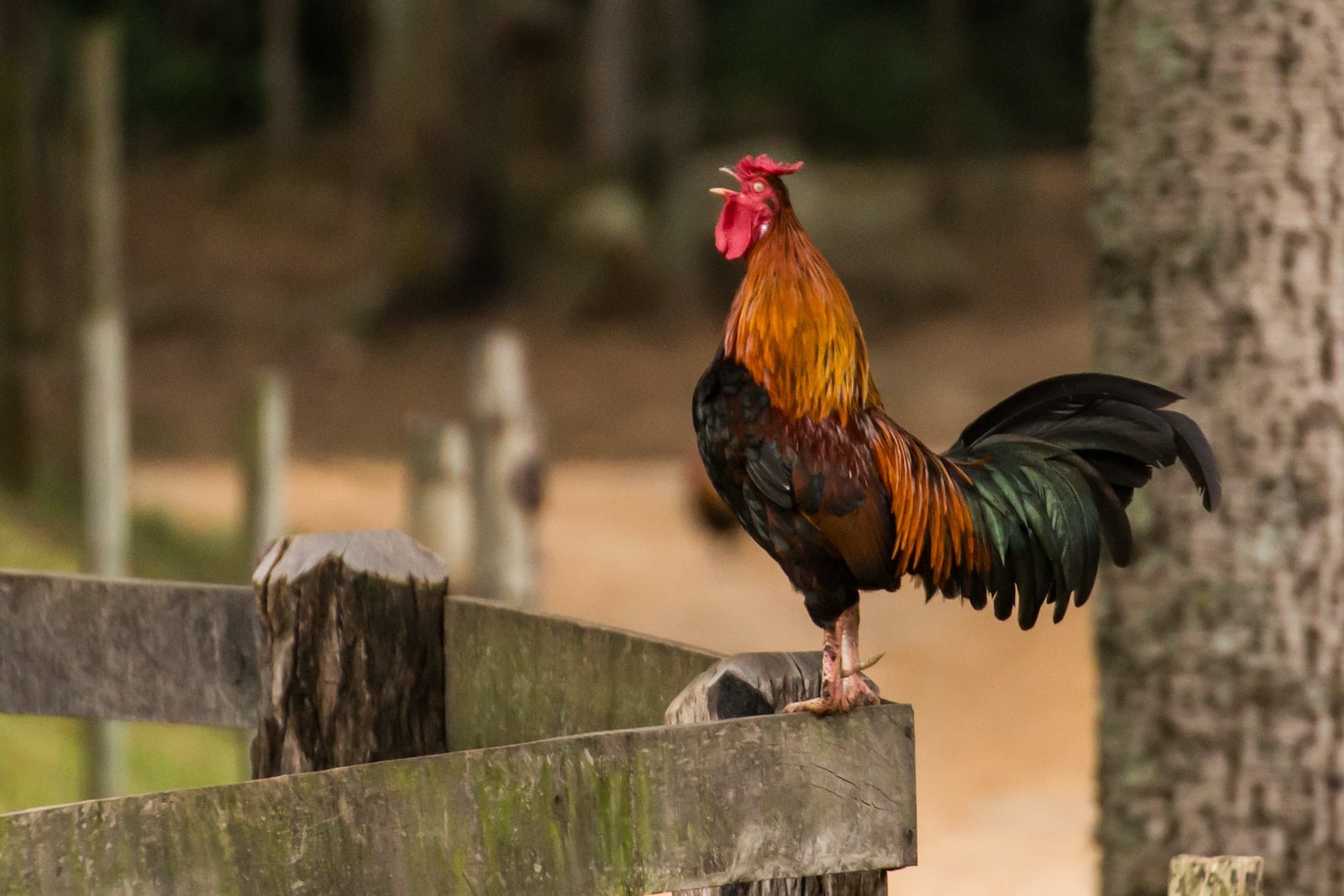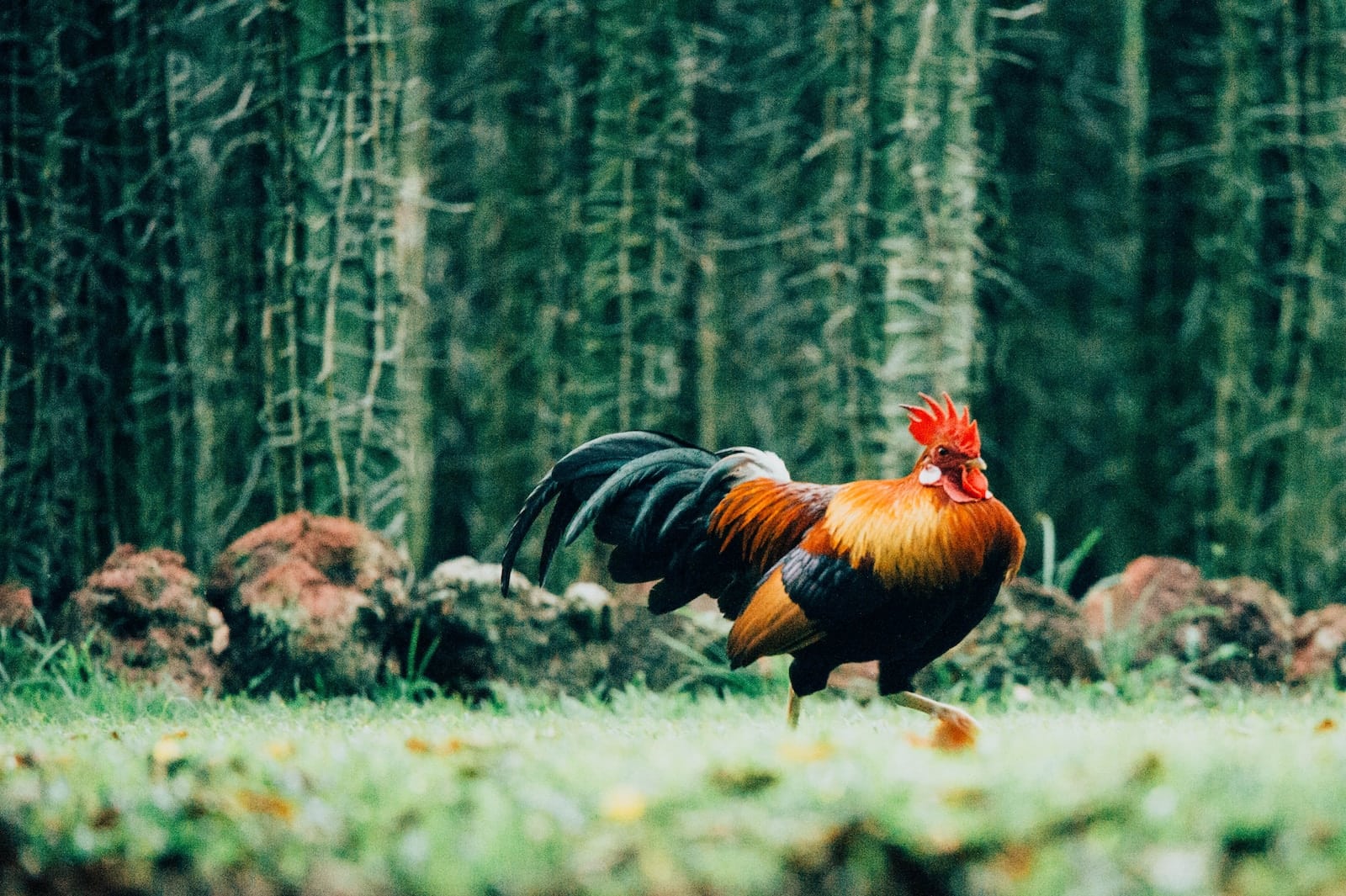Are you wondering about the life of your crowing friend in the backyard? A rooster can live for several years, but their lifespan often varies depending on many factors. Our blog post dives into what affects how long these feathered fellows strut around and offers practical advice to help them lead longer, healthier lives.
Keep reading to uncover the secrets to a rooster’s longevity!
Understanding the Rooster Lifespan
The average life cycle of a rooster can be affected by various factors such as genetics, housing conditions, and exposure to predators. Providing proper care and nutrition, ensuring a safe environment, and monitoring for any health issues are essential in extending your rooster’s lifespan.
The average life cycle of a rooster
A rooster usually lives between 5 to 8 years. But some can live longer if they get really good care. They start out as eggs and hatch into chicks after about 21 days. Then, they grow up fast.
In just a few months, they look like grown-up roosters with bright feathers and strong voices.
Good food, safe homes, and keeping them healthy can help roosters lead a full life. They become adults at about 6 months old and can be in charge of their own group of chickens soon after that.
As they age, you might notice changes in their feathers or how much they crow. Taking care of these older roosters is important for their well-being.
Factors that can impact a rooster’s lifespan
The average life cycle of a rooster includes various factors that can impact its lifespan. These factors include genetics, housing conditions, exposure to predators, nutrition, and access to professional help.
- Genetics: The genetic makeup of a rooster plays a significant role in determining its lifespan. Certain breeds may be predisposed to specific health issues or have longevity traits.
- Housing conditions: The environment in which a rooster lives impacts its overall well-being and lifespan. Adequate shelter from extreme weather conditions is crucial.
- Exposure to predators: Roosters that are exposed to constant threats from predators may experience stress and anxiety, impacting their longevity.
- Nutrition: A balanced diet is essential for the overall health and longevity of a rooster. Proper nutrition supports immune function and overall vitality.
- Access to professional help: Regular veterinary care and access to professional assistance can identify and address potential health concerns early on, potentially extending the rooster’s lifespan.

Tips for Extending Your Rooster’s Lifespan
To ensure your rooster lives a long and healthy life, it is important to provide proper care and nutrition, create a safe and stress-free environment, and regularly monitor for any health issues.
These factors can greatly impact the lifespan of your rooster and contribute to its overall well-being.
Providing proper care and nutrition
To help your rooster live a long and healthy life, it’s vital to provide proper care and nutrition. Ensure they have access to a balanced diet, including grains, seeds, vegetables, and clean water.
Also, maintain a clean living environment for them by regularly cleaning their coop and providing enough space for exercise. Regular health check-ups can also help in identifying any potential issues early on.
Creating a safe and stress-free environment is equally important in extending your rooster’s lifespan. Additionally, monitoring their behavior and habits can give you valuable insights into their overall well-being.
By following these guidelines consistently, you’ll be supporting your rooster’s health and longevity.
Ensuring a safe and stress-free environment
To ensure a safe and stress-free environment for your rooster, it’s essential to provide secure housing with protection from predators. Regularly inspect the coop for any potential hazards or weaknesses that could compromise safety.
Additionally, create a calm and peaceful atmosphere by minimizing loud noises and disturbances around the rooster’s living space. Providing ample space for exercise and natural behaviors can also contribute to reducing stress in your rooster.
Regular monitoring of your rooster’s behavior and interaction with other animals can help identify any signs of distress or anxiety. Ensuring that the living conditions are clean and hygienic will further promote a healthy and stress-free environment, thus contributing positively to your rooster’s overall well-being.
Regularly monitoring for any health issues
To ensure your rooster’s well-being, it’s crucial to regularly monitor its health for any potential issues. Keep an eye out for changes in behavior, appetite, and physical appearance that could indicate underlying health concerns.
Performing routine check-ups and promptly addressing any signs of illness can help maintain your rooster’s overall health and longevity. Additionally, seeking professional veterinary care when necessary is essential in ensuring early detection and effective treatment of any health issues that may arise.
Health monitoring helps identify problems early on, allowing for timely intervention to prevent them from worsening or becoming life-threatening. Regular wellness checks are a proactive approach to maintaining your rooster’s good health and ensuring a longer lifespan by promptly addressing any developing health concerns.
Factors That Affect Rooster Lifespan
– Genetics, housing conditions, exposure to predators, nutrition, and access to professional help are all factors that can significantly impact a rooster’s lifespan.
Genetics
Genetics play a significant role in determining a rooster’s lifespan. Just like humans, roosters inherit certain genetic traits from their parents, which can affect how long they live.
Some breeds are naturally predisposed to longer lifespans due to their genetic makeup. Breeders often select for specific traits that can impact longevity, so choosing your rooster breed carefully could have an impact on how long it lives.
Now let’s delve into the next section about “Housing conditions” and its influence on a rooster’s lifespan.
Housing conditions
Providing appropriate housing conditions is crucial for the well-being and longevity of roosters. A safe and comfortable coop that protects them from extreme weather, predators, and disease is essential.
The coop should be spacious enough to allow natural movement and social interaction among the roosters while also providing nesting areas for rest and egg laying. Additionally, ensuring good ventilation, clean bedding, access to fresh water, and a balanced diet within their living space are vital for maintaining optimal health and extending their lifespan.
Exposure to severe weather conditions or overcrowded living spaces can cause stress in roosters leading to various health issues affecting their overall lifespan. Therefore, it’s important to regularly inspect the coop for any maintenance needs and ensure a clean environment conducive to healthy growth.
Exposure to predators
Roosters are at risk of predators such as foxes, raccoons, and hawks. Providing a safe and secure coop is essential to protect roosters from these threats. Regularly inspecting the coop for any potential entry points and ensuring it’s predator-proof can help safeguard roosters from harm.
Transition: Now let’s delve into the impact of nutrition on a rooster’s lifespan.
Nutrition
A rooster’s diet significantly influences its lifespan. Providing a balanced diet rich in protein, vitamins, and minerals is crucial for their health and longevity. Include grains, vegetables, fruits, and insects to ensure they get essential nutrients.
Avoid excessive treats high in fat or sugar as it can lead to obesity and related health issues.
Ensuring your rooster receives proper nutrition plays a vital role in extending its lifespan. A well-balanced diet positively impacts their overall health and resistance to diseases.
Proper care goes beyond nutrition; providing a safe and stress-free environment also contributes significantly to your rooster’s wellbeing.
Access to professional help
If your rooster is showing signs of illness or distress, it’s crucial to seek professional help from a qualified avian veterinarian. Look for a vet experienced in treating poultry, as they can accurately diagnose and treat any health issues your rooster may have.
Regular check-ups with a professional can also help catch any potential problems early on, contributing to your rooster’s overall wellbeing and longevity. Professional guidance ensures that any health concerns are addressed promptly, giving your rooster the best chance at a long and healthy life.
Access to professional help from an avian veterinarian is essential for ensuring the well-being of your rooster. A knowledgeable expert can provide valuable advice on nutrition, behavior, and overall care specific to roosters, promoting their good health and enhancing their lifespan.
FAQ
How long do most roosters live?
Most roosters live for about 5 to 8 years, but their lifespan can be influenced by various factors. Genetics, diet, living conditions, and access to veterinary care all play a role in determining how long a rooster lives.
A healthy environment with proper nutrition and regular health check-ups can contribute to extending a rooster’s lifespan.
Rooster life expectancy varies depending on the breed and individual circumstances. Providing adequate care and attention throughout their life can help ensure that your rooster lives a long and fulfilling life.
What is the oldest rooster on record?
The oldest rooster on record lived for 22 years. This remarkable rooster, named Charlie, was of the Red Pyle color breed. He enjoyed a life filled with proper care and attention, living to an impressive old age due to the exceptional care provided by his owner.
How can you make your rooster live longer?
To ensure a longer lifespan for your rooster, providing proper care and nutrition is essential. Creating a safe and stress-free environment, along with regular monitoring for any health issues, can significantly contribute to extending your rooster’s life.
Routine access to professional help when needed also plays a key role in maintaining the overall health and well-being of your feathered friend.
Ensuring that your rooster has access to a balanced diet, appropriate living conditions, protection from predators, and periodic check-ups by a veterinarian can collectively support an extended lifespan.
What breeds of roosters tend to live the longest?
When considering what breeds of roosters tend to live the longest, it is important to note that generally, smaller and lighter breeds such as Leghorns and Sussex roosters have been observed to have longer lifespans.
These breeds often exhibit more vigor and agility, leading to a longer life expectancy in comparison to heavier breeds. Moreover, crossbred roosters or mixed-breed chickens may also display enhanced vitality and longevity due to genetic diversity.
Selecting these particular breeds can potentially contribute to extending the lifespan of your rooster.
Do roosters make good pets?
Some roosters can make good pets, especially if they are raised from a young age and handled regularly. However, it’s important to remember that roosters are territorial and can become aggressive, especially during mating season.
If you’re considering a rooster as a pet, it’s essential to provide proper training and socialization to ensure they interact well with humans and other animals.
When keeping roosters as pets, choose docile breeds known for their friendly demeanor. Proper care, attention to behavior cues, and meeting their needs for space, food, water, shelter is crucial in ensuring they remain calm and content in a domestic setting.
Conclusion
In conclusion, understanding the factors that impact a rooster’s lifespan is crucial for their well-being. By providing proper care, nutrition, and a safe environment, roosters can live longer lives.
Monitoring for health issues and seeking professional help when needed also play significant roles in ensuring a rooster’s longevity. Remember that genetics, housing conditions, predator exposure, nutrition, and access to veterinary care all contribute to how long a rooster can live.

